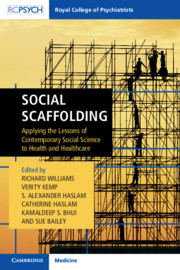Book contents
- Social Scaffolding
- Social Scaffolding
- Copyright page
- Contents
- Contributors
- Foreword
- Note
- Section 1 Schooling
- Section 2 Scoping
- Section 3 Sourcing
- Section 4 Scaffolding
- Chapter 23 Making Connectedness Count: From Theory to Practising a Social Identity Model of Health
- Chapter 24 Public Health Values and Evidence-Based Practice
- Chapter 25 Social Scaffolding: Supporting the Development of Positive Social Identities and Agency in Communities
- Chapter 26 Synthesising Social Science into Healthcare
- Chapter 27 Relationships, Groups, Teams and Long-Termism
- Chapter 28 Caring for the Carers
- Chapter 29 The Importance of Creating and Harnessing a Sense of ‘Us’: Social Identity as the Missing Link Between Leadership and Health
- Chapter 30 Smithtown as Society
- Section 5 Sustaining
- Index
- References
Chapter 27 - Relationships, Groups, Teams and Long-Termism
from Section 4 - Scaffolding
Published online by Cambridge University Press: 14 June 2019
- Social Scaffolding
- Social Scaffolding
- Copyright page
- Contents
- Contributors
- Foreword
- Note
- Section 1 Schooling
- Section 2 Scoping
- Section 3 Sourcing
- Section 4 Scaffolding
- Chapter 23 Making Connectedness Count: From Theory to Practising a Social Identity Model of Health
- Chapter 24 Public Health Values and Evidence-Based Practice
- Chapter 25 Social Scaffolding: Supporting the Development of Positive Social Identities and Agency in Communities
- Chapter 26 Synthesising Social Science into Healthcare
- Chapter 27 Relationships, Groups, Teams and Long-Termism
- Chapter 28 Caring for the Carers
- Chapter 29 The Importance of Creating and Harnessing a Sense of ‘Us’: Social Identity as the Missing Link Between Leadership and Health
- Chapter 30 Smithtown as Society
- Section 5 Sustaining
- Index
- References
Summary
Speaking on the BBC Radio programme, Desert Island Discs, on 15 July 2018, Billie Jean King, a tennis star of the 70s and 80s and a campaigner for gender equality and social justice.
- Type
- Chapter
- Information
- Social ScaffoldingApplying the Lessons of Contemporary Social Science to Health and Healthcare, pp. 274 - 288Publisher: Cambridge University PressPrint publication year: 2019
References
- 1
- Cited by



